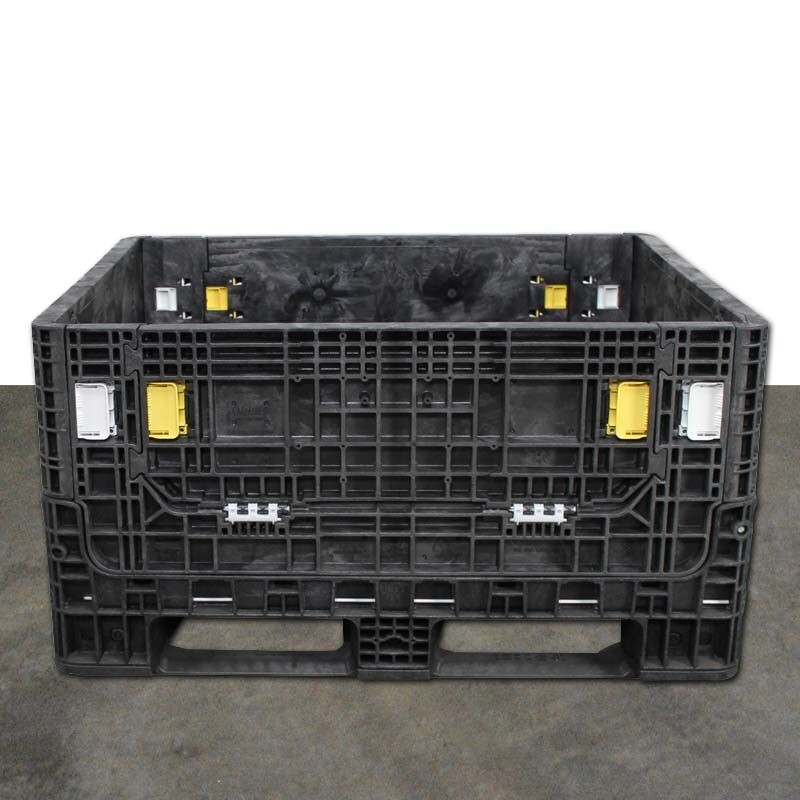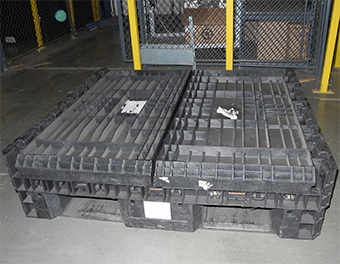The Ultimate Guide to Picking the Right Mass Containers for Your Service Demands
Choosing the suitable bulk containers is critical for any company that depends on efficient logistics. Various kinds of containers exist, each developed for specific materials and applications. Factors such as dimension, material compatibility, and governing requirements play a substantial function in this decision-making process. Comprehending these elements can cause improved functional effectiveness. Many companies ignore important aspects that might boost their overall effectiveness and sustainability. What are these considerations?
Understanding Various Sorts Of Bulk Containers
Mass containers serve as crucial tools for organizations looking for efficient storage space and transport solutions. These containers are available in numerous types, each designed to fulfill details operational needs. One typical type is the intermediate bulk container (IBC), which is optimal for granulated and liquid materials, supplying an equilibrium of capability and ability to move. An additional preferred choice is the mass bag, or FIBC, appropriate for completely dry, flowable products. These adaptable containers are lightweight and can be easily moved and kept. For much heavier materials, stiff bulk containers are frequently used, supplying durability and security for safe handling. In addition, there are customized containers customized for harmful products, making certain compliance with security regulations. Understanding the distinctive attributes of these bulk container kinds allows services to make enlightened decisions that enhance logistics and minimize costs. By choosing the best container, firms can enhance their operational efficiency and streamline their supply chain processes.
Trick Material Factors To Consider for Mass Containers
When choosing mass containers, it is necessary to ponder the materials utilized in their construction. Variables such as toughness, chemical, and strength compatibility play a critical duty in making certain the containers fulfill certain operational needs. In addition, weight and mobility concerns can affect both performance and transportation logistics.
Material Toughness and Strength
Longevity and toughness are vital consider choosing materials for mass containers, as they directly affect the container's capacity to stand up to numerous environmental conditions and dealing with procedures. Materials such as high-density polyethylene (HDPE), polypropylene, and stainless steel are generally preferred for their robust residential or commercial properties, supplying resistance to temperature, impact, and abrasion fluctuations. The option of product additionally affects the overall life-span of the container; stronger materials typically lead to much less frequent replacements, leading to cost savings in time. Additionally, the weight of the material can affect delivery costs and convenience of handling. Businesses must consider their particular operational settings and the potential for wear and tear to assure peak sturdiness and toughness in their bulk container choice.
Chemical Compatibility Elements
Comprehending chemical compatibility is important for choosing mass containers, as the materials made use of need to stand up to the details substances they will certainly hold. Various elements affect compatibility, including the chemical nature of the materials, temperature level, and duration of storage space. Destructive chemicals may call for containers made from stainless steel or specialized plastics that withstand degradation. Additionally, responsive materials can produce warmth or gases, demanding aired vent or pressure-rated containers. The option of container material, whether metal, polycarbonate, or polyethylene, ought to align with the chemical properties of the kept substances to avoid violations or leaks. Inevitably, an extensive analysis of these compatibility elements guarantees secure handling and storage space, safeguarding both workers and the setting while keeping item stability.
Weight and Transportability Concerns
Selecting mass containers entails not just examining chemical compatibility yet also taking into consideration weight and mobility. Companies must examine the convenience of handling and transport to maximize effectiveness. Light-weight materials like high-density polyethylene (HDPE) or light weight aluminum can help with much easier motion and decrease shipping expenses. On the other hand, larger containers might supply boosted durability but can prevent mobility, specifically in settings calling for frequent moving. Additionally, the layout of the container ought to permit for convenient lifting and stacking, guaranteeing ergonomic safety and security for workers. Companies ought to additionally think about the framework offered for transport; for example, containers compatible with forklifts or pallet jacks can improve operations. Eventually, the appropriate equilibrium between weight and mobility straight influences operational efficiency and expense effectiveness.
Sizing Your Mass Containers for Ideal Performance
When sizing bulk containers, organizations should carefully examine the measurements called for to suit their specific items. Furthermore, weight capability is an important element that affects efficiency and security during transportation and storage. Reliable sizing not just makes the most of space however additionally maximizes operational workflows.
Establishing Container Capacities
Choosing the appropriate measurements for mass containers is crucial for taking full advantage of performance in storage space and transport. Companies should analyze their specific needs, taking into consideration variables such as offered space, the nature of the products being kept, and the techniques of transportation utilized. Accurate measurements assure that containers fit ideally in vehicles and stockrooms, decreasing lost space and reducing managing time. Standard sizes can offer benefit, but customized measurements may be essential for unique demands or to fit details products. Additionally, it is essential to examine piling abilities and access, as these elements influence general operational effectiveness. Ultimately, the appropriate dimensions result in enhanced company and streamlined logistics, benefiting the total productivity of the organization.
Weight Capacity Considerations
Comprehending weight capacity is crucial for services aiming to enhance their bulk container efficiency. The weight capacity of a container straight affects storage abilities, transportation logistics, and overall operational costs. Choosing containers with the appropriate weight limits guarantees that companies can safely save and carry their products without risking damage or conformity issues. Overwhelming containers can bring about structural failings, while underutilizing capability cause wasted resources. When picking containers, it is important for services to analyze their product weights and consider any regulatory demands. Additionally, factors such as the sort of material, planned use, and ecological conditions should likewise influence weight capability decisions. By reviewing these components, companies can boost effectiveness and assure a structured supply chain.
Governing Compliance and Security Specifications

Governing conformity and safety and security standards play a necessary function in the option of bulk containers for organizations. Organizations needs to guarantee that their containers fulfill numerous policies established by neighborhood, national, and international authorities. These requirements typically relate to product safety and security, architectural honesty, and appropriate labeling, which help stop mishaps and assure the safe transportation of products.
Additionally, adherence to industry-specific guidelines, such as those from the Fda (FDA) or the Occupational Security and Wellness Administration (OSHA), is essential for firms taking care of harmful products or food items. Non-compliance can cause fines, legal issues, or damages to a business's reputation.
Services need to additionally think about the container's compatibility with the products being saved or transferred to stay clear of contamination or chain reaction (used collapsible containers). To summarize, recognizing and carrying out regulatory compliance and security standards is essential for the responsible and reliable use of bulk containers
Sustainability Alternatives for Eco-Friendly Bulk Containers

Companies are additionally checking out choices made from recycled materials, which not just save sources yet additionally sustain the recycling sector. Moreover, developments in layout permit lighter containers that call for much less energy to transportation, further improving sustainability. By integrating these environmentally friendly bulk container alternatives, organizations can show their commitment to environmental stewardship while satisfying customer demand for lasting practices. This shift not only helps the earth however can likewise improve brand name track record and consumer commitment.
Cost-Effectiveness and Budgeting for Bulk Containers
While lots of services concentrate on sustainability, cost-effectiveness stays an essential variable when picking bulk containers. Organizations has to evaluate the first purchase cost, in addition to long-lasting functional expenses, to guarantee economic stability. Variables such as reusability, maintenance, and resilience play a considerable duty in establishing overall costs.
Buying high-grade containers might yield higher ahead of time expenses but can cause cost savings with reduced substitute prices and reduced waste. In addition, services ought to consider transport prices and storage effectiveness, as these can influence the total budget.

Often Asked Questions
How Do I Identify the Right Container for Hazardous Materials?
To establish the ideal container for dangerous products, one need to evaluate compatibility with the substance, consider the container's product, check for governing compliance, and assess ability and safety and security features to guarantee correct handling and storage.
Can Bulk Containers Be Personalized for Specific Products?
Yes, bulk containers can be personalized for specific items. used plastic containers. Various features, such as size, material, and design, can be customized to meet distinct needs, ensuring suitable safety and security and performance for carrying and saving different goods
What Is the Ordinary Life-span of Various Bulk Container Types?
The ordinary life-span of bulk container types differs; plastic containers last 5-10 years, metal containers 10-20 years, and wooden containers usually last 3-7 years, depending on use, upkeep, and ecological conditions.
Just how Should I Clean and Maintain Mass Containers?
To clean and keep bulk containers, one must regularly evaluate for damage, get rid of residue, wash with suitable cleaning agents, rinse extensively, and guarantee proper drying prior to storage. Complying with supplier guidelines boosts long life and security throughout use.
Exist Rental Options for Mass Containers Available?
Yes, many business use rental choices for bulk containers, offering versatility for companies. These rentals can fit various demands, permitting companies to handle supply efficiently without the dedication of buying containers outright.
Toughness and stamina are crucial variables in choosing materials for mass containers, as they directly influence the container's capacity to endure various environmental problems and handling procedures. Understanding chemical compatibility is necessary for selecting bulk containers, as the materials used should stand up to the specific compounds they will certainly hold. Recognizing weight ability is essential for companies intending to enhance their bulk container effectiveness. Regulatory conformity and safety standards play a crucial role in the choice of bulk containers for organizations. While numerous services concentrate on sustainability, cost-effectiveness remains a vital element when picking mass containers.